|
|
|
Sort Order |
|
|
|
Items / Page
|
|
|
|
|
|
|
| Srl | Item |
| 1 |
ID:
193234
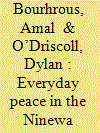

|
|
|
|
|
| Summary/Abstract |
Although the need for local ownership of peacebuilding is routinely emphasized, the importance and the modalities of engaging with local cultures and traditions are not adequately understood, and the peacebuilding potential of local customs remains largely unharnessed. Drawing on extensive interviews with community leaders (n94) and farmers and villagers (n107), and using a conceptual framework that combines notions of the everyday and events that mark a rupture with the everyday, this article explores the opportunities that local people’s everyday interactions, culture, and traditions offer for peacebuilding in post-Islamic State Ninewa Plains, Iraq. In doing so, the article makes a theoretical contribution to the everyday peace literature by further developing existing typologies of everyday acts and attitudes of everyday peace. Demonstrating how everyday acts and attitudes of peace sit on a scale with negative peace on the one end and positive peace on the other, the article introduces the concept of ‘affinity’ on the positive peace side of the scale, to refer to an affective engagement with the other and to acts of getting to know, understand, and participate in what is important to the other community.
|
|
|
|
|
|
|
|
|
|
|
|
|
|
|
|
| 2 |
ID:
193231
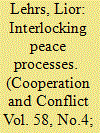

|
|
|
|
|
| Summary/Abstract |
What is the dialectical influence between interlocking peace processes? The scholarship in the field of conflict analysis has identified the occurrence of “interlocking conflicts”—namely, linked conflicts that affect each other—but less attention has been drawn to the linkages between efforts to resolve them. The article focuses on the phenomenon of “interlocking peace processes,” in which parallel peacemaking efforts take place among interlinked conflicts. This article examines how progress in one peace process can influence an interlocking process, and the conditions under which a breakthrough in one process can trigger progress in a parallel process or undermine its advancement. It offers a theoretical framework for the analysis of interlocking peace processes, outlining three main arguments, which rest on three influence patterns: complementing peace processes, competing peace processes, and a paving-the-way peace process. The discussion considers how the mechanisms of diffusion, identity formation, and legitimization serve as dominant tools in these processes. The article uses the interlocking peace processes in the Arab-Israeli conflict as a case study, examining the relationship between four processes in the Middle East: the Israeli- Egyptian, Israeli-Palestinian, Israeli-Jordanian, and Israeli-Syrian peace processes.
|
|
|
|
|
|
|
|
|
|
|
|
|
|
|
|
| 3 |
ID:
193230
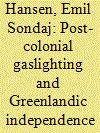

|
|
|
|
|
| Summary/Abstract |
This article proposes the concept of ‘post-colonial gaslighting’ to analyse subtle forms of colonialism and domination in international relations and the persistence of hierarchies in the international system. It asks why Greenland, despite electoral majorities for independence, remains a part of the Kingdom of Denmark. Going beyond existing materialist explanations focusing on lack of economic development, the article deploys the framework of ontological insecurity to show how Danish elites through techniques of gaslighting challenge the post-colonial status of Greenland and prevent agency. The Greenlandic colonial experience is rejected and delegitimised, in turn providing the foundation for blaming Greenlanders for failing to live up to the criteria of statehood. The article thus breaks with widespread assumptions of voluntarism in the literature on non-sovereignty, as well as introducing mechanisms of contestation to the literature on ontological security. The theoretical contribution of the article is the conceptual marriage of the hierarchy and ontological security literatures through the concept of post-colonial gaslighting.
|
|
|
|
|
|
|
|
|
|
|
|
|
|
|
|
| 4 |
ID:
193233
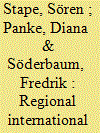

|
|
|
|
|
| Summary/Abstract |
Foreign aid to regional international organizations (RIOs) has increased tremendously in recent decades. The vast differences between RIOs give rise to the question of why some RIOs attract considerable amounts of aid while others attract much less, or even nothing at all. To address that question, this article sets out and examines a set of hypotheses that focus on various characteristics of RIOs that allow donors to reduce transaction costs. Empirically, the analysis proceeds via two steps: the hypotheses are first subjected to an empirical plausibility probe based on quantitative methods and then illustrated based on case study of the Southern African Development Community. The findings reveal that RIOs are most attractive when they operate in a range of policy fields, involve many member-states and are engaged in long-lasting collaborations with donors. By contrast, there is little support for conventional explanations as to why RIOs attract funding – for instance, claims that being democratic, being most in need or providing donors with market access will lead to greater funding. The rather disturbing policy implication is that a small number of RIOs are likely to continue to attract the bulk of funding, whereas poorly funded RIOs are unlikely to attract significant amounts of aid.
|
|
|
|
|
|
|
|
|
|
|
|
|
|
|
|
| 5 |
ID:
193232


|
|
|
|
|
| Summary/Abstract |
Security partnerships between unequal partners walk a fine line between mutually beneficial cooperation and coercion. This article theorizes resource provision in security partnerships in which a funder substantively supports a recipient organization. Specifically, I develop an argument concerning the effect of principal–agent interactions in security partnerships on the recipient’s agency through mechanisms of agenda-setting and capacity-building. The European Union’s (EU) peace and security partnership with the African Union (AU) illustrates the contentious politics of resource mobilization in security partnerships, and how these politics affect the secretariat of the recipient organization. The article arrives at the rather optimistic conclusion that the EU is a generous partner with an explicit goal of cooperative engagement. Furthermore, opportunities for coercion are minimized by the EU’s internal bureaucratic obstacles, the AU’s strategic sequencing of the resource mobilization process, and the overarching post-coloniality of the partnership. However, occasional episodes of coercive EU behaviour have led to considerable tensions in the partnership. These findings add important contrast to postcolonial critiques of AU funding: the AU Commission exercises considerable organizational agency, which relegates the EU – despite being a large payer – to the role of a small player, particularly when it comes to directly influencing the AU.
|
|
|
|
|
|
|
|
|
|
|
|
|
|
|
|
| 6 |
ID:
193229
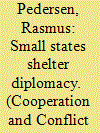

|
|
|
|
|
| Summary/Abstract |
Shelter theory has emerged as a promising but unrealized alternative to existing theories of bandwagon and hiding in the literature. It describes how small states can utilize the structural power of great powers to achieve political aims through the formation of asymmetric alliances. At present it is not clear exactly what shelter diplomacy aims to achieve, what type of costs it protects small states against and to what degree asymmetric shelters are useful when the preferences between the small state and the shelter partner widen. The article addresses these gaps. It develops a realist inspired model of shelter diplomacy that specifies when, how and with what effects small states can utilize the structural powers of great powers. It demonstrates how shelter diplomacy can help small states balance the costs of abandonment and entrapment in the alliance dilemma through construction of both asymmetric and symmetric shelters. The main contributions are to bring shelter diplomacy into the International Relations mainstream literature and develop a new theoretical middle position between the more well-described bandwagon and hiding strategies. The model is applied to a Danish case that demonstrates how small states have utilized and adopted dynamic shelter strategies in the European integration process.
|
|
|
|
|
|
|
|
|
|
|
|
|
|
|
|
| 7 |
ID:
193228
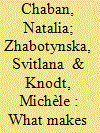

|
|
|
|
|
| Summary/Abstract |
Contributing to the ‘narrative turn’ in International Relations and offering an answer to the question ‘What makes a strategic narrative efficient?’, this article adds to the methodological theorization of the formation and projection phases of the narrative’s lifecycle. We suggest that the impact of the constructed image in the narrative can be reinforced by the interplay of at least three projection properties: (1) content accentuation and priming, through iterations; (2) content contextualization, through historical and cultural resonance with the consumers’ memories; and (3) content verbalization, through narrative tactics that evoke a range of the consumers’ involved attitudes to the framed image. These properties, being intrinsic ingredients of the projected content, tend to enhance emotions. In our work, they get traction in the antagonistic narrative tailored by the Russian propaganda to depict Ukraine orientated towards the European Union (EU). The empirical case study analyses articles published on the Russian e-news platforms portraying the EU granting Ukrainians visa-free travel to the Schengen area in 2017, a milestone in Ukraine–EU relations. We define Russia’s narrative, created in reaction to this event, as antagonistic and consider it to be a precursor of the aggressive narrative crafted/employed by Russia to justify its 2022 military assault on Ukraine’s sovereignty.
|
|
|
|
|
|
|
|
|
|
|
|
|
|
|
|
|
|
|
|
|